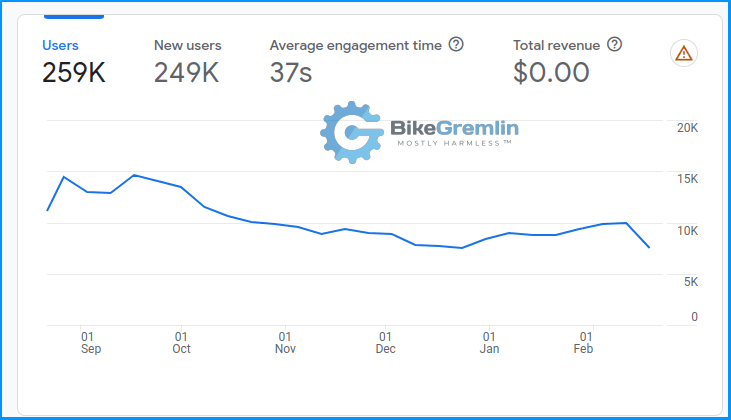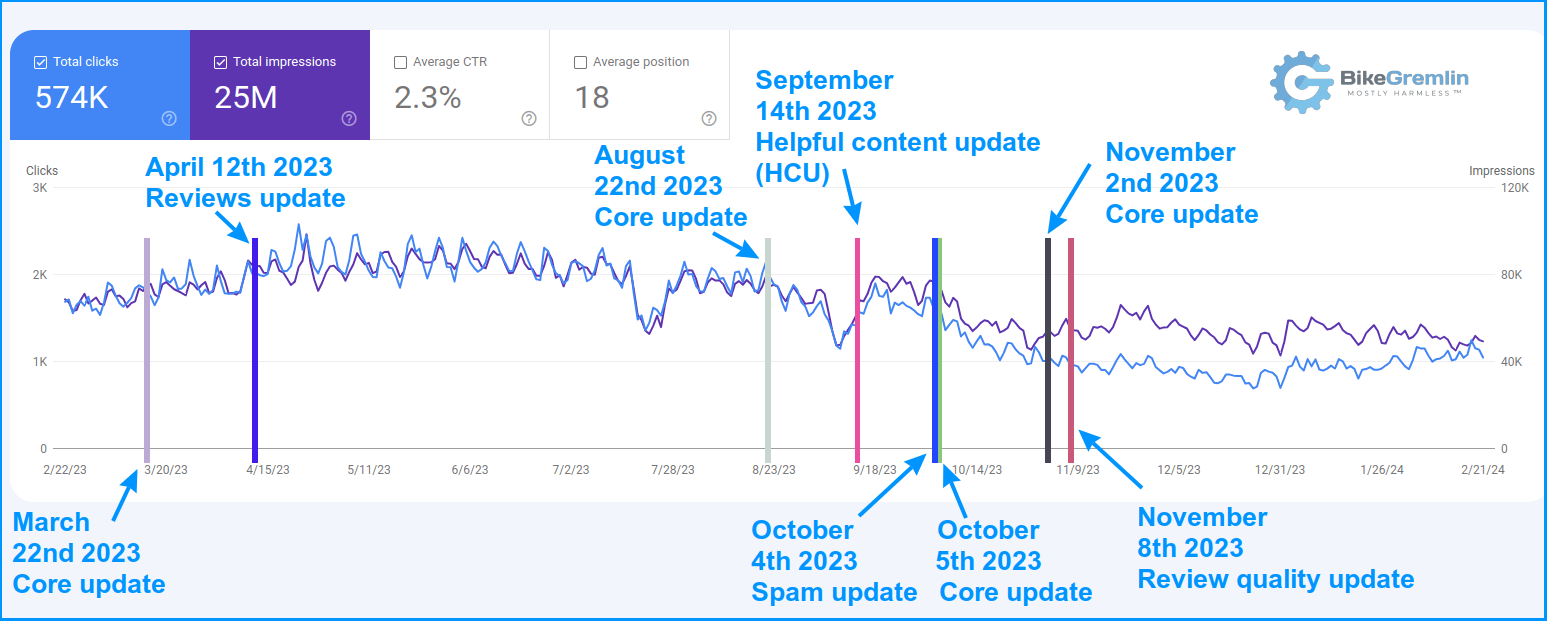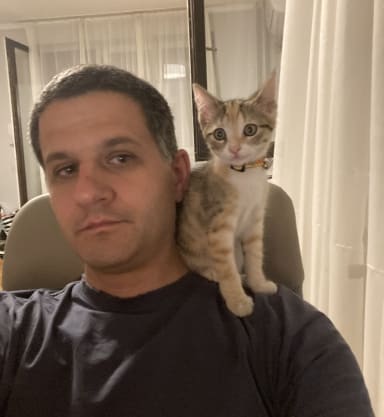Here’s an overview and discussion of BikeGremlin website (and its traffic/Google ranking), along with Google algorithm and “good content advice guides” overview over the years.
Tl/DR: Is your site really as good as you think, and what did Google really mess up?
Table Of Contents (T.O.C.):
- Google’s Guidelines
- BikeGremlin Website Ranking And Traffic
2.1. What Am I Going To Do About It?
2.2. Problems With Google - Google Algorithm And Policy Changes & Updates
3.1. Past decades’ updates
3.2. E-A-T
3.3. E-E-A-T
3.4. HCU - Conclusion
1. Google’s Guidelines
To make a website that suits Google’s criteria, all you have to do is go through these Google Search Quality Ratings Guidelines (a 168-page PDF published in November 2023) and implement them. Couldn’t be simpler? 🙂 Google put a great emphasis on what hey call E-E-A-T (Experience, Expertise, Authoritativeness, and Trustworthiness). That makes sense, at least in principle and theory.
Basically, the above-noted 168-page PDF boils down to:
- Write about stuff you are an expert in, with a lot of experience.
- Write well – for human readers.
- Have your website work well (UI/UX, speed, security etc.).
Unfortunately, there are many other technical stuff that a normal person (who is not an SEO expert) can easily miss. The result is that sites like this one (hobby, independent, one-man) can’t afford the money (or the time) to deal with all the technical peculiarities – not if you want to have some time left for writing helpful, good articles. This leads us to the next chapter.
Fun fact:
Google’s stance on AI-generated articles has shifted over the past years. They moved from “it’s spam” to “if you make a good article with AI, it’s OK” (“Our focus is on the quality of content, rather than how content is produced”).
Update:
My article discussing why Google’s guidelines are impossible to satisfy.
2. BikeGremlin Website Ranking And Traffic
BikeGremlin started in 2015. It took around 100 high-quality articles over the course of three years for BikeGremlin to gain some traffic in 2018. I never worried too much about “SEO”. I just did my best to make my site(s) be easy to navigate, fast, secure, and did my best to write high-quality articles (why I bother to write articles).
I also listen to reader feedback. This BikeGremlin forum thread nicely demonstrates my acting upon some user suggestions/corrections, and disregarding other (based on what I consider being the best – for the readers):
https://www.bikegremlin.net/threads/bicycle-rim-tape-explained-article-critique.67/
That lead to traffic and ranking growth over the years, until the HCU update of September 2023.


Here are the performance stats for the past 12 months from the Google Search Console, with Google algorithm updates marked:
I used the GSC Guardian Chrome extension to make the graph

As you can see, the performance (ranking and traffic) dropped to almost half of what it was a year ago.
- Did I do something wrong?
Not as far as I know. I keep my articles up-to-date and improve & correct stuff based on reader feedback (comments, questions, praises, and complaints), but I’ll discuss this further in chapter 2.1. - Did some other sites become a lot better?
As far as I know, no. Not in terms of articles (“content”). Maybe SEO. - Correlation doesn’t mean causation.
This may have nothing to do with Google algorithm updates (though I doubt that). There is no way for me to really know what caused this drop.
This leads us to the next “chapter:”
2.1. What Am I Going To Do About It?
Nothing.
What?! OK, my editor says I can double the word count for this “chapter.”

So, here goes:
Mostly nothing™ 🙂
OK, OK, I’ll explain – and yes, maybe there is something that I could do, and that you could do with your website:
Unlike many (most?) “content writers,” I write about stuff I work and have experience with (and have a lot of theoretical knowledge about – see: theory vs practice). My websites and YouTube help me a lot with my work: they are a reliable reference and reminder (I forget stuff I don’t write down). When I started making public (Internet) articles, I edited my notes to be beginner friendly. The basic idea is: every technical term (what isn’t common knowledge) must be defined either in the article, or with a link (leading either to my, or another good website article).
It is very difficult to write one article that helps the pros and the novices at the same time. Even with a good table of contents (for an easy overview and “skipping” to the parts of interest), it’s still not ideal. For years I’ve been planning to make shorter article version for the busy single moms and the 60-second attention span folks normal people. 🙂 The problem is that my time is limited (I write in my free time), and there is still a list of questions I often get that I wish to write articles about.
What I could do is either edit the existing articles to have a brief summary right at the start, or make a “deal with myself” to write one short article version first, before writing each new “normal” article. Or both.
About editing:
This very article originally started with what is now “chapter” 3. That’s how my brain works, that’s the logical introduction for me. But, when I read the article, I thought: “no normal person is going to read or care about this, that’s a bad way to start an article.” I do that with most articles (word-count gets cut in half during editing, even though it often doesn’t look like that 🙂 ), but I should put more emphasis on brevity and making the point right away.
However, that’s been on my to do list for years now (many articles have already been edited, and I did write a few short versions for some stuff). The amount of high-quality articles that an expert who writes in spare time can make is very, very limited (compared to profitable companies who hire “content writers”). Even if I could, I wouldn’t want to “compete” with those – not at the cost of quality.
Yes, the feedback I get from pros and novices is very positive (thanks to, or despite my long-windedness). That could be a selection bias though (those who bother to write are usually either very pleased, or very pissed), so I take that with a grain of salt. The fact my sites help me with my work is irrelevant, because there are very few people like me in the world (I’m being honest and objective, not bragging – having a curious and analytical mind is often a curse 🙂 ).
Website owners hit by the latest Google algorithm changes could also make a good, hard, painful, and objective look at their website – “through the eyes of the visitors.” Is your site really as good as you think it is? Can you fix and improve it – for your visitors?
Yes, yes – I don’t think it’s all on you and I will talk about Google too, in the next “chapter:”
2.2. Problems With Google
Thanks to human greed, millions of articles are written every day by underpaid “content writers” or robots (AI) “for SEO”. That is: a vast majority of websites and articles on the Net are made to rank and make money, not to help or educate. Let that sink in.
Google can easily figure out the crappy stuff, but its algorithm (AI) can’t easily distinguish the mediocre (i.e. made for ranking) from the excellent stuff. At the time of writing, the only way for Google to cope with that is (oversimplified, but that’s what it boils down to):
- Rely on Reddit moderators (humans) and Reddit member upvotes & downvotes.
- Rely on big (corporate) brand website editors to not allow utter crap to be published on their sites.
So, with the best of intentions, many great small & independent websites are getting killed, and all the Internet traffic is being directed towards the corporate-owned platforms. So, Internet is becoming a censored and walled garden, and “SEO” is a pay-to-win game today.
For example, BikeGremlin (based on reader feedback, not just in my opinion) is what Google says they want to see on top: articles written by an expert in the field – for humans (not for the search engines). Why does it rank worse, intead of better, after the latest Google algorithm updates?
With no traffic, there is no revenue whatsoever, so websites can’t remain online – and why should they if no one reads what they have to say?
As far as I’m concerned, even if ranking and traffic drop to zero (and Patreon donations dry out), I will keep my sites running. They are well-optimized to run on cheap hardware (especially with zero visitors “hitting” the server 🙂 ), and it’s awesome that I can go anywhere and search my sites for reliable info when I go: “now, how did I do that exactly?” or when someone asks a question (saves time to just shoot a link instead of explaining).
I touched upon this topic in two other articles:
- How and why Google put Reddit and Forbes on top?
- How and why is the Internet becoming a walled garden for the profitable stuff?
According to this article by Edward Zitron, Google did deliberately make their search results worse – and have been doing so since 2019: “The Man Who Killed Google Search.” It is very well written and informative, I recommend it.
3. Google Algorithm And Policy Changes & Updates
Here is a brief overview of major Google algorithm updates (many smaller are left out – if you think I’ve left out an important one, please let me know):
3.1. Past decades’ updates
3.2. E-A-T
3.3. E-E-A-T
3.4. HCU
3.1. Past decades’ updates
- 2009, February – Vince update
Big brands got a ranking boost for searches related to their business. - 2010, June – Caffeine update
Google improved their page indexing speed. - 2011, February – Panda update
The Caffeine fast indexing helped index too many pages from “content-farms” and sites filled with adverts – Panda killed the pages rated as low quality to clean up the mess in search results. - 2012, February – Venice update
Altering the (local business) search results based on user’s IP address (and physical location). This made having a Google My Business page a must for any local store. - 2012, April – Penguin update
Penguin killed sites with keyword stuffing (writing for search engines, not for humans) and with fake, paid spammy backlinks. It also allowed you to kill competition by making spammy backlinks to their site (this was fixed after a few years, to a great degree). - 2012, August (and 2014) – Pirate update
Sites with pirated (copyright) material got slaughtered, and now you can file a copyright claim to Google to take a pirate site off from its search results. - 2013, August – Hummingbird algorithm overhaul
Google tried to understand the searches/questions, instead of blindly concentrating on keywords. - 2014, August – Pigeon update
More search result cohesion between “normal” search and Google Maps results. Local review sites (like Yelp) were killed in favour of Google My Business pages. Local brick-and-mortar stores results were cut from 8 to 3 results in searches under the “local” listing. - 2015, April – Mobilegeddon update
Google started rewarding mobile-friendly websites. - 2015, October – RankBrain update
Machine learning algorithm that improves Google’s understanding of what you’re actually looking for – regardless of any typing mistakes or exact keywords used. - 2016, September – Possum update (unconfirmed)
A big change in local pack (local business) search results – without Google ever having admitted making this algorithm update. - 2017, March – Fred update (unconfirmed)
Sites that concentrated on revenue instead of visitors (too many adds, aggressive marketing etc.) were slaughtered. Google never addmited to making this algorithm change. Google starts placing a strong emphasis on its “Quality guidelines“. - 2017, April – Owl update
Google tries to tackle “fake news” and “uppsetting results” by using feedback from “quality raters” who fill in feedback forms and whine about offensive or innacurate results.
3.2. E-A-T
- 2018, August – Medic update
Slaughter of medical, financial and other sites on similar topics called YMYL (Your Money or Your Life) – if they didn’t seem trustworthy enough to Google’s algorithm (i.e. without an acceptable level of “expertise, authority, and trust (E-A-T)” in Google’s algorithm’s eyes). - 2019, December – BERT update
Update centred on improved Natural Language Processing (NLP). BERT stands for Bidirectional Encoder Representations from Transformers. In plain English: Google can now understand what you’re looking for even if you write a long sentence. - 2020, January – Featured Snippet update
Pages that are listed in featured snippet section are no longer double-listed in search results below the snippet. - 2020, May and December – Broad Core update.
- 2021, May – MUM update
BERT on steroids, MUM (Multitastk Unified Model) can understand even pictures, audio and video. Yes, the Big Brother can now analyze and index YouTube videos just like it can do with articles. - 2021, June – Page Experience update
Depending on how good or bad website’s UI/UX is, the site gets a ranking boost or a penalty. Stuff like CLS, LCP (and FID since 2024) becomes a ranking factor, along with page load speed, and the use of the HTTPS protocol (a pleonasm, yes). - 2022, February – Page Experience for desktop update
Same shit, only for the big screens. 🙂 - 2022, March and July – Product Review update
Google wants to see certain standards when it comes to reviews – or you get slapped! - 2022, August – Helpful Content System update
If you make enough crappy articles, your whole site gets penalized (all your other articles). - 2022, October – Spam update
You know what spam is – if you do it, you get penalized (for those playing dumb, here is Google’s definition of spam).
3.3. E-E-A-T
- 2022, December – Helpful Content update
The E-A-T (expertise, authority, and trust) from 2018 got another “E” and became E-E-A-T (Experience, Expertise, Authoritativeness, and Trustworthiness). So, in adition to convincing Google that you’re an honest expert in the field, you must also prove you’re experienced in what you’re writing about. - 2023, March 22nd ~ 28th – Core update
- 2023, April 12th ~ 25th – Reviews update
The 2022 Review update refined. - 2023, August 22nd ~ September 7th – Core update
3.4. HCU
- 2023, September 14th ~ 28th – Helpful content update (HCU)
The complete slaughter of “niche, “SEO”, and affiliate websites. With all the rankings given to Reddit, Forbes, and a few other major brands. My article about the HCU. - 2023, October 4th ~ 19th – Spam update
Another 2022 update – updated & refined. 🙂 - 2023, October 5th ~ 19th – Core update
- 2023, November 2nd ~ 28th – Core update
- 2023, November 8th ~ December 7th – Review quality update
Another refinement (now only showing Reddit for reviews – LOL).
4. Conclusion
Be honest with yourself and with your readers. Make high-quality stuff because life is too short to do stuf which isn’t meaningful (i.e. only for profit). Unlike before 2023, based on the latest algorithm changes, that will probably not be rewarded by Google and you will probably not get much traffic – but it can help in other ways (why writing articles can be good even if you don’t rank 🙂 ).
Google will probably not be able to fix the current situation. Thanks to the advancements in AI, things will get worse, a lot worse. So, enjoy life, improve what you can, and don’t sweat about what you can’t change.
Last updated:
Originally published:
Help BikeGremlin
stay online & independent
This website is educational, free, objective, and not commercial
(sponsors don’t enjoy paying if you mention all the product downsides that you notice 🙂 ).
If you find this site to be good and helpful,
and if $5 per month is what you can afford to set aside,
please consider supporting my work with a Patreon donation:

